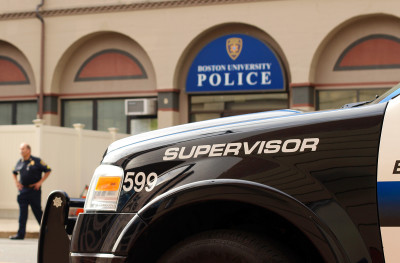
A bill in the Massachusetts State Legislature seeks to make private college police departments operate similarly to city departments by making records publicly available, which could have implications for university and student reputations alike.
Massachusetts Rep. Kevin Honan, who proposed the bill on Jan. 20 with Massachusetts Reps. Patricia Jehlen and Paul Donato, has petitioned for certain law enforcement records to be designated as public records.
“All records, reports or other documentary materials or data made or received for the purpose of law enforcement by a special state police officer of a college, university or other educational institution shall be public records,” the bill states. “Such public records shall be kept and maintained in the custody of the law enforcement unit of such college, university, or other educational institution.”
The Commonwealth defines public records as “every record” by a government entity or its employees “unless a specific statutory exemption permits or requires it to be withheld in whole or in part.”
The bill currently stands with the Joint Committee on State Administration and Regulatory Oversight.
This public records issue has a history in Boston, as The Harvard Crimson filed a suit against the president and fellows of Harvard College, Harvard University Police Department, and HUPD Chief Francis Riley in 2003 “seeking declaratory and injunctive relief to compel HUPD to disclose its records,” a memorandum stated.
“Harvard maintains that it is a private institution and, therefore, the records of its campus police are not subject to the [Massachusetts] Public Records Law,” the memorandum stated. “It appears to this court that the public importance of disclosing police records is just as high when the police officers at issue are authorized to perform and often do perform the same functions as the state and local police officers.”
The Crimson lost the case, yet over a decade later, Honan and his associates are continuing the fight for the release of private records.
Several Boston area university police departments, including Boston University’s, do not send their daily crime logs by email, but instead require on-site review, according to a Muckrock review of disclosure requirements for campus police published Sept. 15. The author of the review notes that BUPD denied a public records request, citing The Crimson’s case, after the Massachusetts State Police shot a suspect near campus in June.
Robert Rosenthal, a professor of journalism at Suffolk University, said from a press standpoint students have as much of a right to police records as the Boston Globe or other newspapers.
“That should be part of your learning experience and how to cover such things,” Rosenthal said. “Also you’re providing a great public service to the university community.”
Rosenthal argued that criminal logs regarding activity such as underage alcohol violations on campus should maintain anonymity of those involved if released, but most other cases should be made public.
“Other than that, if something happens, like there is an accused rape on campus, that should be public knowledge,” Rosenthal said. “That’s important information and that should still be an item that is covered in your newspaper and our newspaper [and others].”
Fred Bayles, a professor of journalism at the BU’s College of Communication, said if public police departments are compelled to honor requests, so should private universities.
“Public police departments have to release records,” Bayles said. “Perhaps that some of the hesitation about releasing these records, you could argue, might have something to do with the fear that it gives the university a bad reputation.”
From BU’s standpoint, Bayles said he has full confidence in the school’s disclosure of criminal logs.
“BU does a really good job with informing its students what’s going on,” Bayles said. “I doubt there are hidden events or information coming out of these police records that would shock anybody.”
Peter Enrich, a professor of law at Northeastern University, said students wouldn’t benefit from either disclosure or refusal of disclosure of police records.
“My understanding is [university police] already have to provide some summarized data,” Enrich said. “In lots of ways they act like public police forces, and in some ways [records] should be open to reasonable disclosure. Most of the time students have other things on their mind, but I’m sure there are situations in which that would be useful information.”
Massachusetts Secretary of State William Galvin filed a petition for the 2016 Election ballot to improve public records requests.
Several residents said releasing private colleges’ police records would provide students much needed information.
Amy Thurston, 29, of Mission Hill, said people have a right to know criminal statistics regarding their university.
“Everyone should know public information and have all the information about the neighborhood that they are going to live in,” she said. “When I was a student I would have liked to know that information.”
Pamela Marco, 32, of Brighton, brought up how often private institutions keep things private.
“Honestly, I feel like private colleges and universities are always allowed to just cover things up and keep them private,” she said. “The fact that they’re keeping their police records private just adds to that and it would be good if the public was allowed to see them.”
Vaddhana Suos, 33, of Allston, however, suggested that some institutions might have a reason to protect the anonymity of students.
“I understand why people would want the records public,” she said. “The thing is though, is that sometimes students might want to keep their names out of records if they’re going public. Maybe the universities are just keeping their students interests at heart.”
Olivia Quintana contributed to the reporting of this article.























































































































Russell Grand • Oct 15, 2015 at 6:32 am
What many people do not realize is that in many cases the records CAN be publicly examined…contingent upon the charges involved, all someone need do is go to the courthouse where the case is docketed to be adjudicated and examine the “pleadings”…the case jacket w/ all of the reports related to the case.